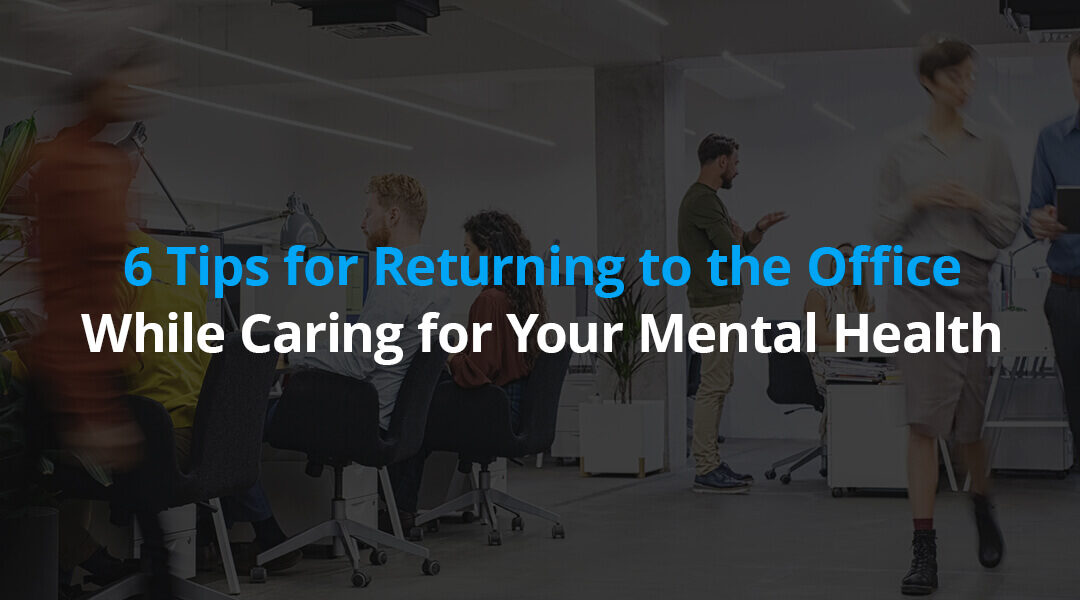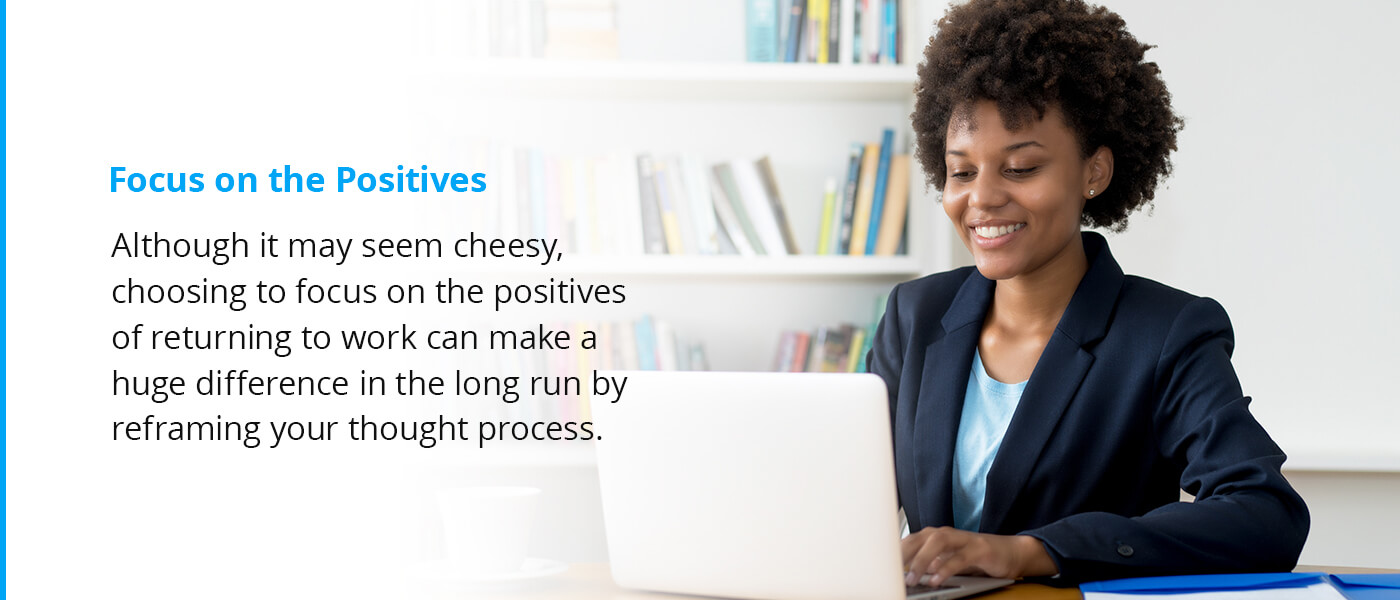As more Americans become fully vaccinated, offices all around the country are starting to open up for maximum capacity. After over a year of adjusting to remote work, returning to the office now can feel as strange as the initial transition to working from home. Some find the idea of going back to work on-site to be exciting and long-awaited. But many companies have proved that efficient remote work is possible, so some people are wondering why the return to the office is necessary. Many are feeling unsure about this transition and even have fears about returning to the office. If you identify with this phenomenon, there are many others who feel the same way. So what can you do to plan for the impending return to the pre-COVID-19 way of life? While we can’t plan for exactly what this transition may look like, we can plan for how we respond to change and make time for our mental health. Use the tips below for returning to the office after COVID-19 and find actions you can take to turn a stressful situation into one of opportunity.
Acknowledging Anxieties and Mixed Feelings
First things first — it’s important to acknowledge all the mixed feelings you may be experiencing. Returning to the office can be equal parts intimidating and relieving. It can add more structure to your days and provide a stronger sense of work-life balance. However, there are lots of things that have changed over the course of the pandemic, and it’s understandable that you might be apprehensive about the change. If you’re feeling less than excited about transitioning back to your usual workspace after COVID-19, you’re not alone. Over two-thirds of workers have reported being concerned about the return to their physical offices. Beyond just worries, many have also reported the desire to remain working from home full time. These feelings can be caused by lots of things — in fact, some people feel anxious for no reason other than the fact that change can be scary. Some have concerns about getting sick since not everyone is vaccinated, while some are self-conscious about changes they’ve gone through over the past year. Some are simply not looking forward to facing small talk, dealing with the commute or saying goodbye to the flexibility that working from home provided. Many mental health professionals agree that it’s important to remember others are facing similar challenges. Acknowledge the anxieties or conflicting feelings you’re experiencing and know it’s normal at a time like this.
6 Tips for Returning to the Office
While it was important to prioritize your mental health at the start of the pandemic, it’s just as important to maintain that focus as things go back to normal. Whether you’re feeling apprehensive or downright overwhelmed about going back to the office, this checklist can help you address your fear of returning to the office and make an after-COVID-19 plan.
1. Take Time for Yourself During Your Commute
Whether you walk, drive or take a form of public transportation, your commute to work is an opportunity to focus on yourself. For some people, the hassle of commuting is one of the downfalls of returning to the office. This block of time had been eliminated, offering more time for sleep, exercise or other activities that may have provided comfort amidst the pandemic. Now, introducing the commute back into your schedule can be a chance to reflect or distract yourself in different ways. Listen to music, a podcast or an audiobook. Think about the things you’re grateful for or things you have to look forward to each day. Think of the commute as blocked out time to not just get from one place to another, but to have time to yourself.
2. Practice a Quick Meditation When Feeling Stressed
It’s natural that waves of anxiety may come and go as you prepare to move back to in-person work. When the wave comes, a great way to curb it is to accept that it’s happening and sit with it. To detach from the thought spiral, practice a few moments of focused breathing. By focusing on your breathing or other surroundings, you train your brain to detach from the overwhelming narrative your mind creates.
3. Focus on the Positives
Although it may seem cheesy, choosing to focus on the positives of returning to work can make a huge difference in the long run by reframing your thought process. Don’t dismiss valid worries you may be having about returning to work. Simply come up with a positive thought for each negative that occurs. Positives of your transition back to the office could include:
- More social interaction
- A sense of normalcy and routine
- A stronger boundary between work and home
- Depending on your company, a future where your job provides a hybrid model to satisfy all needs
4. Plan Ahead
When we’re anxious about something, we often crave a sense of control. Even though we can’t control what returning to the office may be like, we can control other things that are related to work. Try planning your work wardrobe ahead, focusing on meal prep or using a daily planner to add structure to the days leading up to your return to the office after COVID-19.
5. Make Your Office Space a Fun Space
Self-care doesn’t have to solely occur outside of work. Use the move back into your office space to bring a little something extra to your desk. Write Post-its to remind yourself to meditate or focus on the positives. Consider even bringing physical objects that relieve anxiety, such as a stress ball, essential oils or other items that bring a sense of peace to your area, like indoor plants.
6. Talk to Someone About Your Concerns
The most important thing to remember when making this transition is that so many others are feeling similar emotions. Connect with your support system of friends, family or coworkers you may be excited to see regularly again. See a therapist about your fears. Talking through your worries and voicing your thoughts can release a weight off your shoulders. Keep in mind that different strategies work for different people. If meditation or a stress ball isn’t your thing, that’s OK. Speaking to a professional can help you identify coping mechanisms and self-care strategies that work specifically for you.
Find Support With a Professional Therapist in Andover
If you’re looking for more one-on-one support during this time of transition, Merrimack Valley Psychological Associates has a range of specialists to ease this period of uncertainty. We offer services for stress management and anxiety of all levels. Find strategies that work for you without having to leave your home. We offer teletherapy options so you have the flexibility to prioritize your mental health along with outside factors. Contact our office to speak with a professional about any of your work adjustment concerns.
Reviewed By
Dr. David Rainen, PsyD.
I am a licensed clinical psychologist with an extensive background treating a variety of different ages, situations, emotional and mental health disorders in individuals and their families. As part of my 10 year professional and training career in psychology, I have developed and refined my skills and approaches through my work in a variety of diverse settings including: hospitals, community outpatient facilities, college counseling centers, secure and unsecure inpatient/residential treatment programs, and therapeutic day schools.




